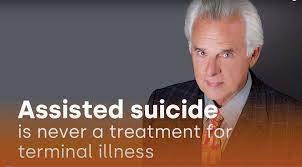Executive Director, Euthanasia Prevention Coalition
The Office of the Chief Coroner of Ontario released the December 2022 MAiD data which indicated that in 2022 there were 3934 reported euthanasia deaths up by 27% from 3102 in 2021.
The Ontario euthanasia data indicates that have been 13,732 (MAiD) deaths since legalization in June 2016. For clarity, there were 13,729 euthanasia deaths and 3 assisted suicide deaths.
According to the data, of the 3934 euthanasia deaths in 2022, 121 were people who were not terminally ill, 20 of the deaths were followed by organ donation and the final consent was waived in 190 deaths. The final consent is waived when a person has become incompetent.
A 27% increase in Ontario euthanasia deaths is significant but less than the 51% increase reported in Québec. (Link to article).
The seventh annual report from Québec’s Commission on end of life care was filed in Québec’s National Assembly on December 9, 2022 covering the (April 1, 2021 to March 31, 2022) period. The report declared that there were 3663 reported euthanasia deaths representing 5.1% of all deaths.
Unlike Ontario, Québec has a multiple reporting system. The Québec report indicated that a discrepancy of 289 euthanasia deaths were reported when comparing the practitioner reports to the Collège des Médecins du Québec reports.
The Ontario data may not be accurate because it only relies on the voluntary reports submitted by the practitioners who cause the death.
The trends in Ontario mirror the national trends.
10,064 assisted deaths in 2021 up from 7603 in 2020, 5661 in 2019, 4480 in 2018, 2838 in 2017 and 1018 in 2016. The report indicated that in 2021 the number of assisted deaths increased by 32.4% representing 3.3% of all deaths with the total number of reported (MAiD) assisted deaths in Canada from legalization until December 31, 2021 at 31,664.
Is there enough killing yet?
In April, 2022; CTV news story reported on a euthanasia death in February 2022 of a 51-year-old Ontario woman who had multiple chemical sensitivities (MCS). According to report, the woman was not terminally ill but living with a chronic condition that made her highly sensitive to chemicals and environmental allergies. This woman was killed not because of an “irremediable medical condition” but because she couldn't afford appropriate housing.
Soon after CTV news reported on a 31-year-old Ontario woman with MCS who was also approved to be killed by euthanasia. These reports of euthanasia for MCS created awareness that euthanasia was becoming a “treatment” for people with disabilities who were living with poverty or issues related to housing or other social conditions. The good news was that this story resulted in a GoFundMe campaign that raised money to enable this woman to afford a clean place to live.
There was the story in September 2022 of a mother who started a campaign to prevent the euthanasia death of her 23-year-old son with diabetes. EPC launched a petition campaign and the mother successfully challenged the euthanasia doctor, who then cancelled the death.
There was the October 2022 story of a disabled Ontario man who was seeking death by euthanasia to avoid homelessness. He was unable to find a new place to live after the building he was living in was sold. This man relied on a disability benefit and he was unable to find an affordable place to live. He said that he would rather die than become homeless. Thankfully a GoFundMe campaign raised enough money to enable him to find a place to live.
I was very pleased by the recent news that Portugal's Constitutional Court rejected a euthanasia bill for the second time based on the imprecise language of the bill.
Canada's euthanasia law employs imprecise language that has been loosely interpreted. Sadly the deaths by euthanasia continue to increase exponentialy in Canada.
More information:- Québec Euthanasia deaths increase by 51% in 2021-22 annual report. A discrepancy of 289 deaths (Link).
- Canada releases 2021 euthanasia report. More than 10,000 deaths representing 3.3% of all deaths (Link).
- Ontario euthanasia deaths increase by more than 30% in 2021 (Link).

.jpg)
.jpg)








%20Web.jpg)
.png)

.jpg)







